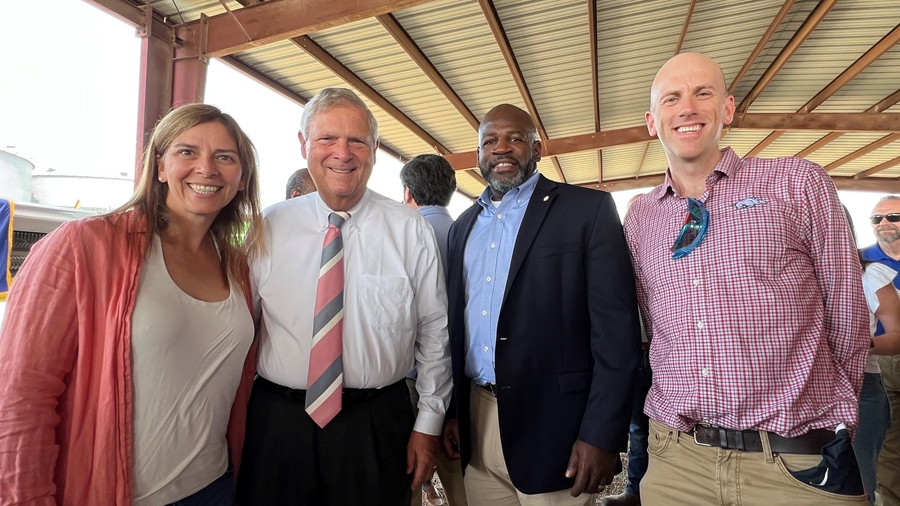Report Provides Scientific Plan for Nature-Based Climate Solutions

From left: Michele Reba, research hydrologist for the USDA-Agriculture Research Service in Jonesboro; Tom Vilsack, U.S. Secretary of Agriculture; Deacue Fields, vice-president for agriculture, U of A System; and Ben Runkle, associate professor of biological and agricultural engineering.
Agricultural engineering professor Ben Runkle has co-authored a report by leading ecosystem scientists and policy experts calling for a scientific approach to nature-based climate solutions in the United States.
The report is the result of dozens of scientists and policy experts gathering in Washington, D.C., in June to confront the consequences of climate change and ensure scientific footing for nature-based climate solutions.
The report reviews the current knowledge in the field and offers a multidisciplinary plan for the science, tools and technologies needed to support a policy that will mitigate the effects of climate change.
The researchers are calling for a roughly $1 billion investment in science and infrastructure development to ensure nature-based climate solutions are robust and credible, that ground-based experiments and monitoring inform rigorously benchmarked maps, model predictions and protocol evaluations.
“Although the investment necessary to generate this information is not small, it is a fraction of the amount already allocated to implement nature-based solutions,” Runkle said. “Investing in sound science to predict, monitor and verify the benefits of these strategies is fundamental to ensuring their success.” Nature-based climate solutions include reforestation, as well as climate-smart agriculture and wetland restoration. They harness natural processes to reduce greenhouse gas concentrations in the atmosphere and slow climate change.
These approaches have substantial and growing support from bipartisan lawmakers, the private sector and conservation-minded organizations, but the scientific evidence to support their effectiveness is not fully developed.
The authors identify critical gaps in the science needed to support large-scale implementations of nature-based climate solutions and chart a research agenda to address these gaps. They also provide a set of principles to guide future assessments of the effectiveness and viability of nature-based climate solutions.
Among the numerous strategies for achieving the overall goal, Runkle’s research group focuses on ecosystem-scale measurement. They use micrometeorological flux towers to measure basic atmospheric conditions. The measurements will enable the team to enhance and expand ground-based monitoring networks and distributed experiments.
This effort includes:
- Creating robust datasets against which models, mapping tools and monitoring protocols can be evaluated and compared.
- Creating networks of distributed field trials and experiments to evaluate emerging or understudied strategies for nature-based climate solutions.
- Enhancing existing environmental observation networks with more representative sites and data.
- Creating a national soil-carbon-monitoring network.
“Essentially we can use the many agricultural fields of Arkansas as test-beds for research under real-world management conditions,” Runkle said. “This provides a quicker and more thorough understanding of how field and farm management can be used to boost sustainability outcomes — quicker because we don’t have to work first in a greenhouse and then an experimental farm.”
Runkle has already started. He recently received $1 million from the USDA Climate Smart Agriculture Initiative, a project led by USA Rice and Ducks Unlimited. The award was part of $80 million in funding from U.S. Department of Agriculture to reduce greenhouse gas emission associated with rice production.
The grant was one of 70 announced in September, totaling a $2.8 billion investment in the creation of Partnerships for Climate Smart Commodities by the USDA.
U.S. Secretary of Agriculture Tom Vilsack visited Isbell Farms in central Arkansas on Sept. 16 to highlight the project. Runkle has collaborated with the Isbells for several years, focused on making rice production more sustainable and climate friendly.
About the University of Arkansas: As Arkansas' flagship institution, the U of A provides an internationally competitive education in more than 200 academic programs. Founded in 1871, the U of A contributes more than $2.2 billion to Arkansas’ economy through the teaching of new knowledge and skills, entrepreneurship and job development, discovery through research and creative activity while also providing training for professional disciplines. The Carnegie Foundation classifies the U of A among the few U.S. colleges and universities with the highest level of research activity. U.S. News & World Report ranks the U of A among the top public universities in the nation. See how the U of A works to build a better world at Arkansas Research News.
Topics
Contacts
Benjamin Runkle, associate professor of biological and agricultural engineering
College of Engineering
479-575-2878,
brrunkle@uark.edu
Matt McGowan, science and research communications officer
University Relations
479-575-4246,
dmcgowa@uark.edu
Headlines
Four Students Named Goldwater Scholars; Two Earn Udall Honorable Mentions
Four U of A students have received the prestigious Goldwater Scholarship, an award for top students in mathematics, science, and engineering.
Cross-Campus Collaboration Culminates in New Outdoor Geological Installation
Grand opening event to celebrate the new GeoLab installation at the U of A’s Gearhart Hall courtyard is set for May 3. The installation will be open to the public year-round.
First Students to Use Online Degree to Hone Nursing Leadership, Elevate Patient Care
Hanna Baxendale and Wendi Kimbrell will begin coursework in the Doctor of Nursing Practice-Executive Master of Business Administration program offered by the Eleanor Mann School of Nursing and Walton College.
Join the Office for Sustainability on a Final Cruise to Campus
Cruise to Campus Wednesdays have fostered a gathering space for individuals interested in biking to campus. Drop by the Old Main Lawn from 7:30-10 a.m. Wednesday for coffee, something to eat and conversation.
Fay Jones School Student Ambassador Program Gives Voice to Design Students
The student ambassador program at the Fay Jones School of Architecture and Design is built to connect top design students with their school, its alumni, its future students and others inside and outside the school.




